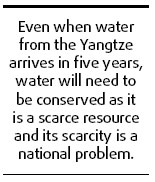Writ in water
With a population of nearly 20 million, Beijing is facing an unprecedented challenge to have enough water for its economic development and the daily use of its residents.
The 10 billion cubic meters of water diverted from the Yangtze River will not arrive in the motropolis until 2014.
The 225 million cubic meters of water diverted from neighboring Hebei province last year to quench its thirst will be used up in less than two months. The municipal government is pushed to save water to make up for the deficit.
Yet it can be interpreted as good news if the concrete measures the city government adopts will conserve more water and turn Beijing into a water-saving city.
Forty polluting enterprises with a high rate of consumption of both water and energy are to be moved out of the capital.
More recycled water is to be used for watering the greenery and golf courts as well as meeting industrial requirements.
By way of a disincentive, the price of water will be raised to make residents aware of the compelling need to save on water use.

All these measures are more than necessary. Whether they are enough for every drop to be used only where it should is debatable. A member of Beijing's committee of the Chinese People's Political Consultative Conference proposed early this year that the car washing business should be closed down, unless they used recycled water. The fresh water used in washing motor vehicles amounts to 30 million tons a year citywide.
If recycled water can be used instead, the fresh water conserved as a result will be as much as the quantity in 10 Kunming Lakes in the Summer Palace.
It is estimated that each public bathhouse uses an average of 300 tons of fresh water a month - which is a tremendous waste. The bathhouse activities are not a public priority and, therefore, these enterprises should be made to pay much higher rates for using scarce water.
Beijing must identify businesses that are wasteful of water and work out whether they should be made to switch to recycled water, billed at higher rates or asked to shut down.
Apart from conserving water, it might be worth considering the merits of rainwater harvesting on a much larger scale.
Beijing already has 600 pools doing the job and the benefits need to be studied before expanding this number.
Even when water from the Yangtze arrives in five years, water will need to be conserved as it is a scarce resource and its scarcity is a national problem.
(China Daily 05/13/2009 page8)














